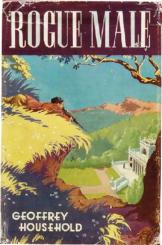|
Somehow the hunter
survives the drop into the marshy area below the cliff, crawls off, and now the
hunter becomes the hunted. He escapes down a river -- possibly the Rhine -- and
manages to find a British freighter with a friendly lst officer who is willing
to take him on board as a stowaway. When they reach London, he disembarks into
the night... and the fog. Home free? No way. Despite the fact that he's a
member of the landed gentry and his brother is the Foreign Minister who just
failed to negotiate a non-aggression pact with Hitler, he finds that Major
Quive-Smith and his Nazi gang have followed him. The pursuit is relentless. The
hero is forced to kill one of the gang in a London Underground railway tunnel
and -- like Buchan's The Thirty-Nine Steps -- Scotland Yard also joins in the
pursuit. The hunter who is now the hunted becomes a survivalist, goes to ground
in a cave in Dorset, south of the city. A lot of symbolism here: a man, hunted
by his avatar (yes, the novelist uses this term), mines a cave in a thorn
thicket in a secluded valley on the archaeological remains of an ancient Roman
Road; the thicket was a love nest the hunter used with a former love ("violet
eyes") who, as it turns out, was tortured and killed by the Nazis. Not only is
the symbolism sexual, it's also mnemonic, as if the hunter is moving back
through Time as his survivalist persona develops.
The narrative is in
the first person, in the form of a journal that the hero eventually mails to a
trusted associate back in London. A lot of it is internal musing which can be
annoying for the impatient contemporary reader who wants the action to
cut-to-the-chase. But it's integral to the hero's character and his world-view
which is an idealized classless self, even though our man is a "gent".
Bourgeois delusion? He talks about "Class X", a type of individual who can move
easily among all classes, all countries, all cultures anywhere in this world.
It's a period idealism that was echoed by other writers in the twenties,
thirties and forties... notably, James Hilton (Shangri-La, 1933), H.G. Wells
(The Shape of Things To Come, 1932)... even the cynical George Orwell (if you
strip the neo-Fabianism away).
'Their tiresome
conception of the State has one comforting effect; it creates so many moral
lepers that no one of them, if he has a little patience, can long be lonely.
The flotsam of the nation is washed together into an unrecognized, nameless
secret society.' [Rogue Male]
Few people remember
Rogue Male today, although its influence is wide and deep. The lone gunman who
can take out a political leader as a moral imperative with lasting impact. The
skilled hunter who can go native, even shape-shift, go animal. He doesn't need
to be as chaotic as a rogue killer elephant -- indeed, Household's anonymous
predator/fugitive is quite passive in that familiar English way -- but he does
need to have that ancestral urge to survive at all costs. Therefore it's
strange to discover that 15% of the story is yet to come after the climactic
action at the burrow in Dorset. A sea voyage to North Africa? Is this really
necessary for the reader to grasp the victory of the protagonist?
Perhaps Fritz Lang's
excellent film adaptation Man Hunt (1941)
causes this problem for any reader who has seen it, as it accommodates the
propaganda needs of WW 2. Scriptwriter Dudley Nichols reengineered the story in
several clever ways to accommodate the visual imperative of film... as well as
the need of a less cerebral audience. Still, there are things that the film
doesn't capture; for example, the fugitive's starlit trek over the Iron Age
hill mound at Eggardon, which has the mystical beauty of a modernist woodcut
illustration by Lynd Ward.
Victoria Nelson's
introductory essay for the eBook/paper reprint is superb and worth the price of
the book alone; not only does she cover off Household's influences, narrative
architecture, world view and so on, but also Household's other novels, i.e.,
his last, the "late masterpiece" Dance of the Dwarfs (1968), set on the
Colombian altiplano. The voice of authority, folks. Students of the
adventure/thriller genre looking to expand their expertise should check this
out, discover the genesis of Rambo and other outsider reverts who work beyond
the law.
LR Feb
'15
Rogue Male at
Amazon:
US
|
Canada
|
UK
|
Australia
*LR's new novel
RADIO
BRAZIL »» |
